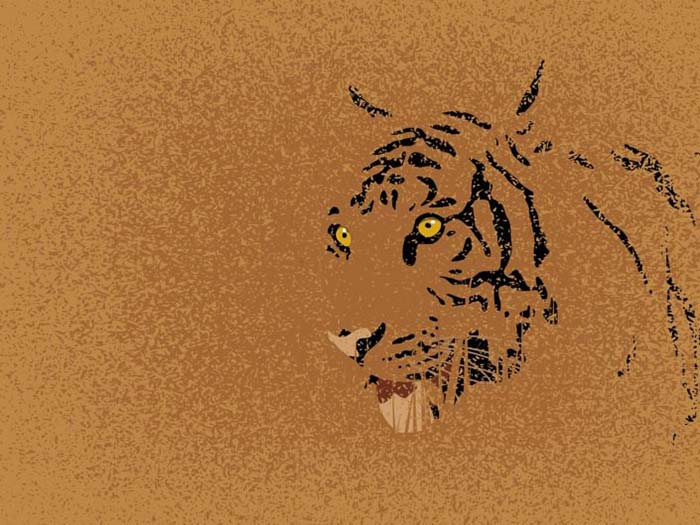The Importance of Recognizing Our True Nature

A starving and pregnant tigress comes upon a flock of goats and pounces on them with such fervor that she brings about the birth of her little one, as well as her own death. The goats scatter but soon come back to find the newborn tiger by the side of its dead mother.
The goats adopt the baby tiger and it grows up believing it is a goat. He learns to bleat and eats grass, but the trouble is that grass doesn’t nourish tigers well, and he grows into a weak and miserable member of his own species.
One day, a large male tiger pounces on the flock and the goats scatter. The young tiger, not being a goat, remains standing there. The big male is surprised to find a young tiger living with goats, and when he enquired into it, the young one simply says, “Maaaa.” Mortified, the old tiger swats him back and forth a couple of times, but the only response coming forth was more bleating and grass nibbling.
The old tiger brings the young one to a pond and makes him look at his own reflection for the first time. He leans over and points out to him, “See, you look like me. You’re not a goat. You are a tiger, like me. Be like me!” He then brings the young tiger to his den and shows him bloody chunks of gazelle meat from a recent hunt. Taking a big chunk, he says “Open up and eat this!” “Oh no, I’m a vegetarian,” says the little one. But the old tiger would not take no for an answer, and shoves a piece of red meat down the little one’s throat, causing him to gag a little. Now the real tiger food is in his gut, getting into his blood. Spontaneously, the young one gives a tiger-like stretch, and then a small little tiger roar.
“Now you’ve got it! Now go into the forest and eat tiger food!” says the big one.
Is there something larger than our ego that wants to come through, to demand authenticity and genuineness in the way we live? Are we to cruise onwards toward that inevitable ending, that certain exit on terms that were assumed and purchased for the first half? The second half of life is not a chronological issue, but a psychological one, in which we question what values and paradigms we are living by.
This is a question for each of us, whatever stage of life we’re in – are we tigers living as goats? If the answer is in the affirmative, then a second question – what is good tiger food? In other words, if we are not living as we ought to be, activating our fullest potentials, then what must we do, what would nourish us towards that?
This is one of my favorite stories from India retold by the late Joseph Campbell.¹ This story tells the truth about the dangers of what can happen when we adapt to our environment at the cost of our true self. When we believe our adapted self is our true self, we stop living out of our true nature. Adaptation is a survival skill yet at a certain point in our life it actually works against us. We must never adopt at the cost of our true nature.
The larger culture does not support living authentically. Adapting to normalized values is encouraged. Every culture is made up of the collective that normalizes the status quo, which results in a life lived from a lower frequency by accepting and not questioning these normalized values. This has been a perpetuated problem all through history. People have adapted to patriarchal rule, injustice, corruption, and even to materialism.
Generational adaptation skews our values away from what is real to what is not real, normalizing it. Consequently, we often mistake our adapted (goat) self for our true (tiger) self. Living this way is the cause of feelings of emptiness and lack of meaning.
If we miss the opportunity to live from our real selves during the first half of our life, we are given another chance in the middle of our life. At this juncture, our psyche shifts and demands living from a more authentic place. If we are living out of our ‘goat’ nature by adapting to be accepted, to survive, or even to belong we are compromising the best parts of us. Our feeling function informs us of this through symptoms of depression, anxiety, or sheer meaninglessness. We may have trouble sleeping, feel lonely, sad, or nostalgic. My medical practice is overflowing with people with these symptoms. These are most often symptoms of not living out of our true nature.
I remember when I worked for corporate health care, years ago, hospital administrators informed me that I was dispensable, I had to be a ‘team player and if I didn’t adapt to their value system, I would be considered a traitor, an outcast, a ‘trouble maker’. They even attacked my medical expertise and undermined it to fear me into complicity. It was clear that since I was refusing to adapt to their value system of placing money and greed over patient care, they were tightening the screws in an attempt to manipulate me to accept their ways. I was 36 at the time, passionate about my vocation, and dedicated to preventive and integrative medicine. I had created a more effective and meaningful method of practice, one aligned with my intention for becoming a physician – to help and to heal my patients. My patients were actually healing, hospitalizations were reduced, and health care costs were significantly lowered. This was a threat to the ‘value’ system of hospital administrators. I realized that healthy patients were a conflict of interest for the hospital’s profit margin. Even though I had been hired to do ‘wellness,’ administrators serving the corporate value system were unhappy when it worked. They had merely hired me as a pawn for capturing market share. Wellness and integrative medicine were really never their true intent.
At the age of 36, I left corporate medicine and never looked back.
When I see hundreds of thousands of physicians employed by administrators who are using them to enforce their corporate value system, I can see why the physician suicide rate ² is at an all-time high, currently 100-fold higher for male physicians than the general population, and 400-fold higher for female physicians.³
Corporate medicine does not care. Physicians are dispensable and simple cogs in the corporate wheel. They are the means for generating profit at the cost of patients. Sickness and disease are expected to be merely managed for generating profit. Healing reduces revenue and is therefore discouraged.
This is what has happened in health care throughout our country. Physicians have adapted to this system like the tiger in the Indian story. If we are to reawaken the soul of medicine, we must recognize our true calling as well as our true nature. Money and patriarchy are never worth losing ourselves over. Meaning must become the core value in medicine. Serving the true vocation of medicine is what is needed to restore meaning. The courage to embody this is what will eventually heal health care.
I envision a time when physicians will have the courage to not cooperate with an administrative value system that compromises their collective soul. This will require realigning their value system with the vocation of medicine rather than materialism, a value normalized and elevated by both our societal and corporate culture. Only then can health care truly transform into the system it was meant to be.
My journey out of corporate health care into an alignment with my vocation has been deeply fulfilling. It has been a lonely yet meaningful path. I would not trade it for any amount of money that corporate medicine could offer me. I wish this level of meaning for all of my colleagues. Collectively, we have what it takes to reclaim the soul of health care, to heal our patients and ourselves. It will, however, require us to connect with our ‘tiger’ nature.
¹ The Joseph Campbell Foundation, http://jcf.org/new/, The Complete Works of Joseph Campbell, The Tiger Who Thought He Was a Goat, 1991 Recording
² KevinMD.com, http://www.kevinmd.com/blog/2013/05/learned-saving-physicians-suicide.html, What I’ve learned from saving physicians from suicide, Pamela Wible, MD, 05/27/13
³ KevinMD.com, http://www.kevinmd.com/blog/2013/07/suicide-female-physicians-recognize-respond-reconsider.html, Suicide in female physicians: Recognize, respond, reconsider, Linda Brodsky, MD, 07/28/13
©July2016 Kalpana (Rose) M. Kumar M.D., CEO and Medical Director of The Ommani Center for Integrative Medicine, Pewaukee, WI. Dr. Kumar is accepting new patients; call our office to schedule at 262.695.5311. www.ommanicenter.com Author of Becoming Real: Reclaiming Your Health in Midlife. 2011, 2014 Medial Press


